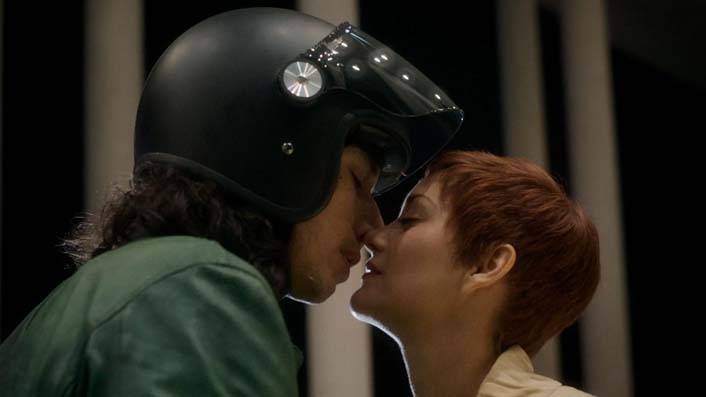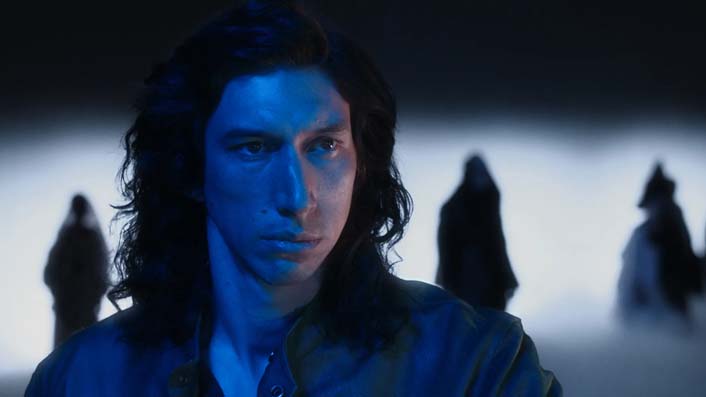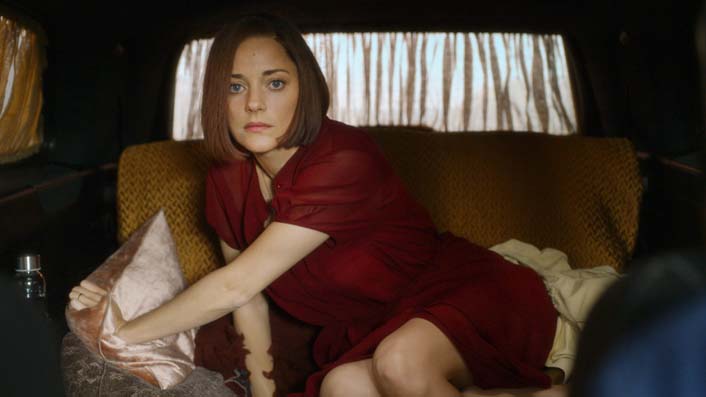You’ll never see another movie like one-of-a-kind musical Annette

Marion Cotillard and Adam Driver star in the musical Annette (now in select Australian cinemas). It might make you laugh, groan, roll your eyes, cry, fill you with rapturous delight—or all the above, writes Amelia Berry.
Before anything else, it’s something of a miracle that Annette exists at all. Not just because it went through five years of production delays and casting changes while leading man Adam Driver wrapped up filming Star Wars (RIP Annette 2016 starring Rihanna), but also because a two and a half hour musical directed by an outrageous French auteur and written by a cult art rock band seems like a completely incredible prospect in 2021’s cinematic ecosystem. But somehow, despite it all, here Annette is, revelling in its own improbability.
See also:
* Movies now playing in cinemas
* All new streaming movies & series
Leos Carax’s first film since 2012’s dark and surreal masterpiece Holy Motors, and the French director’s English-language debut, it’s tempting to reach for something gallic or high brow to try and explain just what exactly Annette is. A Bresson reference, a Godard quote. But while there’s no denying that Carax’s fingerprints are all over this movie, Annette is at least as much a product of writers and composers Ron and Russell Mael, a.k.a Sparks (recently profiled in Edgar Wright’s The Sparks Brothers).
The Maels’ obsessions form the core of Annette: sardonic, deadpan humour, a fascination with celebrity, a love of old the showbiz worlds of music hall and pantomime. Just like with Sparks’ music, the best of Annette is giddy, winking, and dynamic, while the worst is glib, smirking, and impenetrable.
The story of the film is, at its heart, a kind of Victorian melodrama, complete with supernatural retribution, nautical tragedy, and child exploitation. Henry McHenry (Adam Driver) is a successful stand-up who falls in love with opera superstar Ann (Marion Cotillard). Their whirlwind romance quickly leads to marriage and a baby, the titular Annette, played without comment or explanation by a pretty creepy marionette. When Henry discovers that baby Annette has a miraculous gift for singing he recruits Ann’s accompanist (played with wonderful breathlessness by Simon Helberg) to help tour her around the world.
And the whole time all this is happening, they’re singing. Annette is almost entirely through-sung. And not in big dramatic arias declaring their deepest emotions, but in strange repetitive numbers which describe in fairly literal terms what the characters are doing. The film’s centrepiece declares “we love each other so much” at least forty times, maybe more (yes, this is where Adam Driver sings during cunnilingus).

Here, and in the opening number ‘So, May We Start’ this technique works as intriguing, driving, and evocative, but in numbers like “We’re Travelling Around The World” it starts to grate. This isn’t a suite of Sparks songs like “This Town Ain’t Big Enough For The Both of Us” or “The Number One Song in Heaven”, this is a whole film of “How Do I Get To Carnegie Hall”.
Sometimes, Annette feels like a fantastic joke; dark, sly and a bit naughty. Sometimes, you start to feel like maybe the joke is on you. The one through line is that absolutely everything in Annette feels intentional. Carax eschews the artful baroque chiaroscuro of Holy Motors in favor of an ever-morphing mix of styles, mirroring the action on-screen: Ann and Henry together at home are shot softly and naturalistically, the TMZ style inserts look straight out of trashy celebrity magazines, and the boat scene gorgeously recreates the un-naturalism of silent cinema.
Some of the choices are more baffling, Annette singing at the ‘Hyperbowl’ looks like some early 2000’s made-for-TV CGI, and there are some jump-cuts and cross-fades that are just annoying. But never at any point do you feel like this wasn’t exactly the movie that Carax and the Maels wanted to make.

Lots of people will hate this movie. It’s very long and moralistic, it has no interest in juicy character details, backstory, or psychology, and it makes a point of messing with the audience. Some people will adore it for its fabulous one-of-a-kind weirdness. Parts of it, especially the acting and cinematography are undeniably brilliant (there’s a reason this won Carax best director at Cannes).
Leaving the theatre, I may have sent a friend a message along the lines of “OMG it sucks so bad”. But the more I think about it, the more I’m glad I saw it. Not just for its visionary uniqueness, but for the parts of it that were perplexingly, inexplicably fantastic. It might make you laugh, groan, roll your eyes, cry in agony, or fill you with rapturous delight (personally, all of the above), but you will never see another movie like Annette.
















